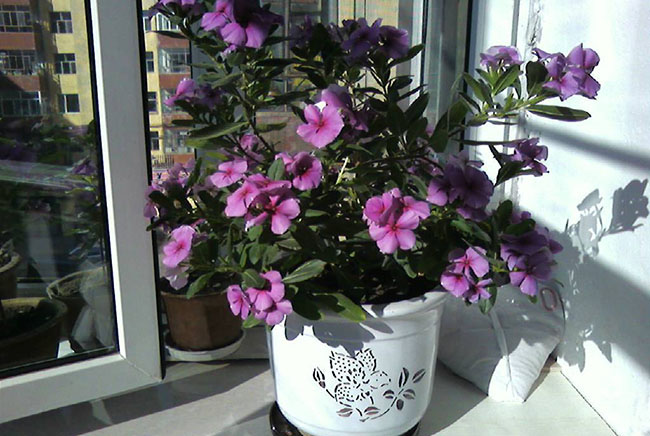Culture methods and matters needing attention of Catharanthus roseus
Growth habits of Catharanthus roseus
The most suitable temperature is 20 ℃-33 ℃, like sunshine, avoid dampness and fear waterlogging, general soil can be cultivated, but saline-alkali soil is not suitable, it is better to use sandy or humus-rich soil with good drainage, ventilation and ventilation, flowering and fruiting almost throughout the year.

Morphological characteristics of Catharanthus roseus
Apocynaceae, Catharanthus roseus. Perennial herbs or subshrubs, often cultivated annual. Plant height ca. 30-60 cm, erect, distally much branched, base Lignified. Leaves opposite, membranous, Obovate moment rounded. Dark green glossy, leaf veins obviously white, Cymes terminal or axillary, with 2-3 flowers, Corolla deep rose red or white, some with hearts, flowers 2.5-3 cm in diameter. From August to frost, the seeds are easy to crack and fall off when they are mature.
Distribution range of Catharanthus roseus
Native to the Mediterranean coast, India, tropical America. The history of Catharanthus roseus cultivation in China is not long, and it is mainly cultivated in the south of the Yangtze River, especially in Guangdong, Guangxi, Yunnan and other provinces (autonomous regions). Various provinces and cities in China have introduced many new varieties of Catharanthus roseus from the world, which are used for potted plants and planting troughs.
Culture method of Catharanthus roseus
First, sowing seeds
Catharanthus roseus is suitable for sowing or cutting, although the growth of cutting is not as good as seeds, but the speed is more intuitive. If the seed is collected, it should be picked along with the maturity, so that the growth ability of the seed will be better.
Second, temperature
The temperature of Catharanthus roseus germination is about 20-25 degrees, and the best time to sow seeds is from March to May. If you want the seeds to blossom early, you can keep them in a warm room and keep the temperature at about 20 degrees. When the outdoor temperature is warm, transplant to the outside.
3. Soil
In the cultivation of Catharanthus roseus, it is necessary to choose the soil with good drainage and the soil made of peat and perlite in the cultivation of Catharanthus roseus. After watering the soil with carbendazim and water, wait until it is slightly dry and then loosen it. After the soil is leveled, it can be used for planting.
Fourth, sunshine
Catharanthus roseus is a positive plant, so it likes plenty of sunlight, abundant sunlight can help the plant to grow, and the plant type will be more beautiful. Secondly, the sun is conducive to flowering, to ensure beautiful flowers and colors.
Notes on Catharanthus roseus:
Basin soil
The basin soil should choose the humus-rich and loose substrate or artificial culture soil. When the sowing seedlings grow 6 true leaves, put them in the pot and put them in the sunny place after planting.
Watering
During the growth period, the basin soil should be dry and wet to prevent it from being too wet or too wet, and avoid stagnant water.
Fertilizer application
Liquid fertilizer should be applied once a month, and available phosphate fertilizer should be added in the bud stage, which is beneficial to plant growth and flowering.
③ pick the heart
The heart needs to be removed for 1 or 3 times.
④ heat preservation
In winter, it can be placed in a greenhouse above 5 ℃ to survive the winter, and the pot soil is better than dry; when moved outside in spring, it can continue to grow and blossom after turning the pot and changing the soil. Propagation method of Catharanthus roseus
Sowing or cutting, sowing in the open bed at the beginning of April, or sowing in the greenhouse in advance between January and February, the germination temperature is about 20 ℃, after germination, it can be planted in a small pot when the Hebei leaves are 4-5, and then replace the corresponding large pot with the seedling growing up, cultivated in the open field, and plant the flower bed when the seedling height is 15-20 cm. Catharanthus roseus can also be cut during the growth period, but the cutting seedlings are not as robust as sowing seedlings and are used less.
Methods of Catharanthus roseus culture and matters needing attention in Catharanthus roseus culture
Catharanthus roseus is a plant with beautiful flowers. Its origin is on the Mediterranean coast of Europe. Catharanthus roseus blossoms almost all the year round and is a very common potted ornamental plant. Let's take a look at the daily cultivation methods of Catharanthus roseus.
Points for attention in the method of Catharanthus roseus culture 1. Fertile soil
Suitable for fertile and well-drained soil, resistant to barren soil, but do not be alkaline. Clayey soil with hardening and poor ventilation will result in poor plant growth, which will lead to yellow leaves of Catharanthus roseus, or even no flowering.
2. There is plenty of sunshine
Catharanthus roseus is a light-loving plant, there must be sufficient sunshine during the growing period, the leaves are green and shiny, and the flowers are bright. If you grow in the shade for a long time, the leaves will turn yellow and fall.
3. Temperature and humidity
Prefer a warm, slightly dry and sunny environment. The suitable temperature for growth is 18: 24 ℃ from March to July, 13: 18 ℃ from September to March of the following year, and the winter temperature is not lower than 10 ℃.
4. Watering control
Catharanthus roseus avoid dampness and fear of waterlogging, basin soil watering should not be too much, too wet affects growth and development. In particular, indoor winter plants should be strictly controlled watering, it is better to dry, otherwise it is easy to freeze. Open field cultivation, midsummer showers, pay attention to timely drainage, so as not to cause the whole area to die by waterlogging.
5. Fertilization control
When applying fertilizer, compound fertilizer and liquid fertilizer can be applied alternately every ten days. The bottom of the Catharanthus roseus pot soil should also be covered with a layer of base fertilizer as far as possible to ensure the nutrient content of the pot soil.
6. Pest prevention
Catharanthus roseus plants are poisonous, so they are more resistant to diseases and insect pests. The main diseases in seedling stage are: seedling quenching disease, Botrytis cinerea and so on. In addition, it is necessary to prevent the occurrence of fertilizer damage and drug damage in seedling stage. If it happens, it should be watered with clean water immediately to strengthen ventilation and reduce the harm.
7. Pruning
Catharanthus roseus is a herbaceous plant, which is more suitable for potted plants, but it should be careful not to let the plant grow too high, affecting indoor decoration and ornamental, so after surviving in the pot, it is necessary to pick the heart several times to promote multiple branches and more flowering, and the residual flowers must be cut off after flowering.
How to raise Catharanthus roseus, how to cultivate Catharanthus roseus and matters needing attention / Control of watering
Catharanthus roseus is a kind of highly ornamental flower, which can be seen in many gardens in our country, and there are also many people raising this plant at home in our country, but there are many places needed in the process of breeding. How to raise Catharanthus roseus? What are the breeding methods and matters needing attention of Catharanthus roseus? Next, the editor will take you to learn about it.
1. How to raise Catharanthus roseus
If we want to know how to raise Catharanthus roseus, we must first understand its growth habits. Catharanthus roseus is a kind of plant that likes light and high temperature, so we must maintain sufficient light in the process of culture. Of course, this is only one of the points, and there are many places that need to be paid attention to. In the following Catharanthus roseus culture methods and matters needing attention are explained in detail, we continue to look at.
II. Culture methods and matters needing attention of Catharanthus roseus
1. Soil selection
In the cultivation methods and matters needing attention of Catharanthus roseus, the choice of soil is the first step, and it is also a relatively important step. We had better choose the soil with a higher degree of looseness, so that the drainage is better, so that Catharanthus roseus can better absorb nutrients. We must not choose soil with salt and alkali, which is not conducive to the growth of Catharanthus roseus.
two。 Fertilization management
Fertilizer is one of the main nutrients in the growth process of Catharanthus roseus. Before planting, we need to add an appropriate amount of base fertilizer to the soil. When Catharanthus roseus reaches the growing period, the demand for fertilizer will be relatively large, basically once every 10 days or so. We can choose water-soluble fertilizer for fertilizer.
3. Temperature management
Catharanthus roseus is a kind of plant that is resistant to high temperature but not cold, so when breeding, the temperature must be controlled well, and the temperature should not be too low. The most suitable temperature for the growth of Catharanthus roseus is between 20 °C and 33 °C. therefore, in the cultivation methods and matters needing attention of Catharanthus roseus, temperature is a point that needs attention.
4. Watering management
When watering Catharanthus roseus, you must have the right amount, and it is best to wait until the soil is dry and water it once, remember not to cause stagnant water, otherwise it will easily lead to rotting roots.
5. Light management
In the above, the editor also mentioned to you that light is a very important part of Catharanthus roseus cultivation methods and matters needing attention. Keeping Catharanthus roseus outdoors exposed to light for a long time can make it grow better. We should remember this.
6. Pest control
In the cultivation of Catharanthus roseus, if you are not careful or the method is wrong is very easy to appear diseases and insect pests, then we need timely treatment, must not be left unchecked, because this will make the plant withered, specific control methods you can refer to Catharanthus roseus pest control article, here the editor will not introduce too much.
- Prev

Culture methods and matters needing attention of Brown Bamboo
Brown bamboo growth habit brown bamboo likes warm, humid and well-ventilated semi-shady environment, not resistant to stagnant water, extremely shady, and should be shaded properly when the summer heat and light is strong. The suitable temperature is 10-30 ℃. When the air temperature is higher than 34 degrees Celsius, the leaves often have scorched edges, the growth is stagnant, and the overwintering temperature is not lower than 5 ℃. Small plant shape
- Next

Culture methods and Disease and Pest Control of Cat's Eye Taro
Cat's eye bamboo taro growth habits like warm, humid and bright environment, not cold-resistant, not drought-resistant, afraid of hot sun exposure, the growth period should be fully watered to keep moist, but the soil should not be stagnant water, it is appropriate to use loose and fertile soil with good drainage and permeability, and slightly acidic soil rich in humus.
Related
- Fuxing push coffee new agricultural production and marketing class: lack of small-scale processing plants
- Jujube rice field leisure farm deep ploughing Yilan for five years to create a space for organic food and play
- Nongyu Farm-A trial of organic papaya for brave women with advanced technology
- Four points for attention in the prevention and control of diseases and insect pests of edible fungi
- How to add nutrient solution to Edible Fungi
- Is there any good way to control edible fungus mites?
- Open Inoculation Technology of Edible Fungi
- Is there any clever way to use fertilizer for edible fungus in winter?
- What agents are used to kill the pathogens of edible fungi in the mushroom shed?
- Rapid drying of Edible Fungi

